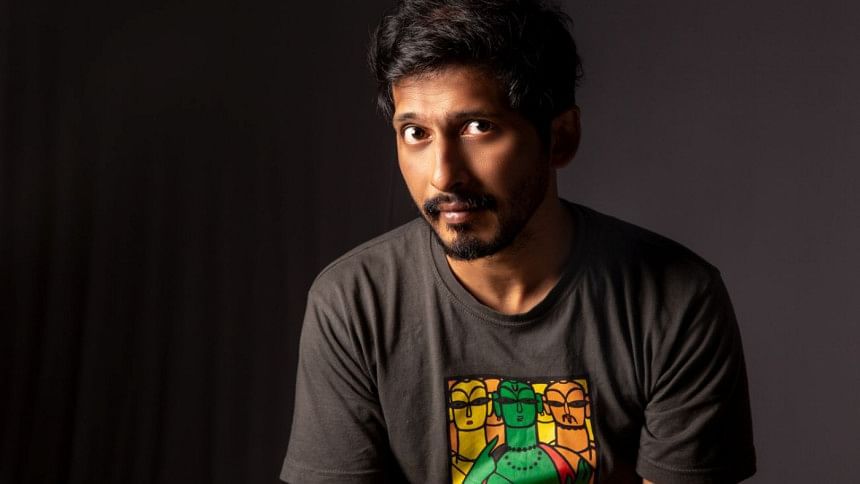a musical DUO

Shayan Chowdhury Arnob and Rafiath Rashid Mithila are familiar faces of the Bangladeshi showbiz scene. Both have made their marks in the industry with their passion, hard work and commitment. The two stars recently collaborated to make a music video titled, 'Ki Hole Ki Hoto', with Arnob composing and lending his voice to the song, featuring Mithila in the music video. This week, Rafi Hossain caught up with the duo to talk about their musical collaboration.
Rafi: Welcome to Uncensored with Rafi Hossain. Today, we have with us the talented duo, Arnob and Mithila. Recently, you two have collaborated for a song. Could your share your experience?
Arnob: Mithila has been quite eager to work with me. She has a very lively personality. I had already created part of the song a while ago, and finished the rest on Mithila's insistence.
Mithila: Arnob's fans are always very excited about his new projects. Everyone has been wondering why Arnob isn't singing anymore, and this song was a treat for them. As we are cousins, I have to often answer questions about his hiatus. That's why I've been so insistent that he should start singing again. However, many people think that I have also sung with him in this song. But, I was just involved with the music video.
Rafi: What was the reason behind shooting the video outside the country?
Arnob: We didn't have any prior plans to shoot in Kolkata. As I often stay in Shantiniketan, and Mithila wanted to visit Kolkata, we decided to get together and shoot there. The music video came together nicely, after we scoped out a few locations for the shooting.
Mithila: The song was released under the label banner of Dhrubo Music Station. There wasn't any particular reason for shooting the music video in Kolkata. Overall, we spent a wonderful time while shooting the video, and had a great experience.
Rafi: At present, songs have become spectacles to be seen, rather than heard. What are your views on this?
Arnob: I've studied visual arts, and always think about the visuals that might go well with my music. The key concern is whether the visuals follow a song, or vice versa. Songs are definitely meant to be heard. However, presently, audiences often want visual narratives to accompany the songs one makes.
Rafi: How important do you think discipline is in an artist's life?
Arnob: An artist must be disciplined. I have learnt how to incorporate orderliness and discipline into my life during my time spent in Shantiniketan. This has helped me immensely to develop as an artist.
Mithila: Artists have to live very disciplined lives. If I speak from personal experience, then I must say that it is essential for actors to work in a methodical, disciplined way. I try to be organised in my personal life as well, because discipline is important in all aspects of life.

Rafi: What is your take on the current state of our music industry?
Arnob: Nowadays, a lot of people are producing great music. However, the standard of work is not always up to the mark. Nevertheless, my concern is that the pursuit of music, the practice or the hard work – whatever you want to call it – is no longer exercised the way it used to be in the past. It seems as though people are busy trying to become hits or go viral overnight. However, I believe we're faltering in terms of education. No one is really investing time in learning. I think it's important for all of us start a conversation about this.
Mithila: I think that our music industry has become very singular. Lately, many people are becoming stars via YouTube and other social media platforms. We aren't creating original or unique music.
Rafi: Arnob, do you want to continue making music like you did when you were first starting out, or do you wish to do something different?
Arnob: I want to innovate and experiment with my music. I also want my music to bring people together. I really enjoy watching a congregation of people singing Tagore songs together. Whenever I see such a sight in Shantiniketan, I feel the music resonating within my heart. Being able to grow up listening to these songs and learning how to sing them is truly a blessing. I ardently wish that we could do something like this in our country. If we had an institute like Shantiniketan, I would really like to teach children how to sing there, based on our own merits.
Mithila: The scene that Arnob has described of masses joining together in a song is impossible to appreciate without witnessing it with your own eyes. It's hard to fathom how easily the rhythm of the music soothes your mind. I've been telling him that we should start something like this for the children here.

Rafi: Is there anything that either of you would like to ask the other person?
Arnob: My question for Mithila is – from where did you get all your strength, and how did you build such an immense fan-following?
Mithila: I know everything about Arnob. There isn't anything left for me to find out.
Rafi: How would you define your relationship with your fans?
Arnob: In the simplest terms, we are one and the same.
Mithila: I would like to add to what Arnob just said – they have accepted us as their own, and it's because of that kinship that we have been able to get to where we are today.
Transcribed by Daminee Zakiya Salahuddin

 For all latest news, follow The Daily Star's Google News channel.
For all latest news, follow The Daily Star's Google News channel. 








Comments